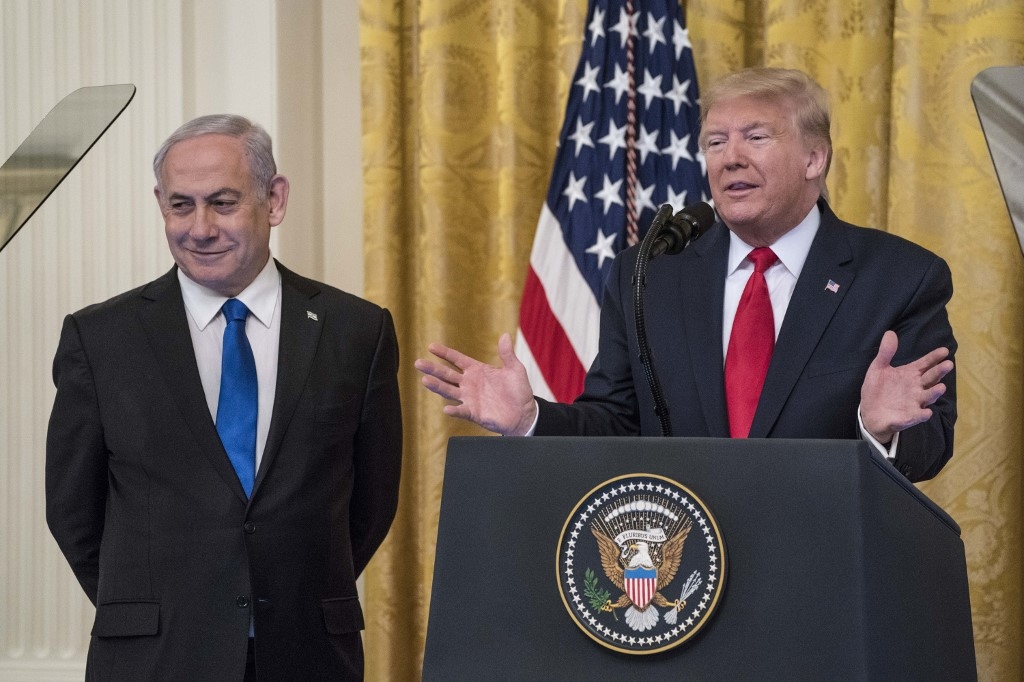Netanyahu's White House extravaganza fails to impress Israeli voters

When Israeli Prime Minister Benjamin Netanyahu took to the stage at the White House last month, right after US President Donald Trump presented his so-called "deal of the century", he left no room for doubt about the importance of the event.
"Today is an historic day," Netanyahu told the excited audience, composed mainly of American Orthodox Jews and evangelical Christians.
Comparing it to 14 May 1948, the day David Ben Gurion declared Israel's independence, the prime minister addressed the American president: "Decades and maybe hundreds of years from now we will remember January 28th 2020 because on this day you became the first world leader to recognise Israel's sovereignty over parts of Judea and Samaria," he said, using the Israeli names for the occupied West Bank.
Thirteen days, not decades, have elapsed since this "historic day", yet it seems that most Jewish Israelis have failed to grasp the greatness of the moment.
Contrary to what happened after Ben Gurion read aloud Israel's declaration of independence in 1948, there were no celebrations in Israel, no dancing in the streets.
Generally speaking, the Israeli public showed a great deal of indifference to the pompous declarations in Washington.
This indifference is reflected in opinion polls for the forthcoming March elections. In a survey published on Friday by Channel 13, the parties composing the right-wing bloc led by Netanyahu were placed on 53 seats, down from the 55 seats they have today.
The centre-left bloc (Benny Gantz's Blue and White, Labor-Meretz and the mainly Palestinian Joint List) rose to 59 seats, very close to the 61 seat threshold which would secure them a majority in the Israeli parliament.
Bad news for Netanyahu
With elections only three weeks away, this is bad news for Netanyahu.
Even if he understood that Trump's deal is not indeed equivalent to Israel's declaration of independence, he certainly expected the ceremony in the White House to have a more positive effect on Israeli voters.
After failing to gain a majority in two consecutive election campaigns in April and September, and after Israel's attorney-general officially indicted him, Netanyahu's chances for re-election in March seem slimmer than ever.
Even his effort to win immunity from parliament failed, after his Blue and White opponents managed to secure a majority to reject it.
Trump's scheme to address the Israel-Palestine conflict was supposed to change this trend. We do not know what pushed the US president to announce his "peace plan" in the middle of Israel's election campaign, after postponing it for at least a year.
Its total one-sidedness in favour of Israel and its settlement and annexation policy certainly pleased Trump's evangelical voters, but as US media attention remained focused on his impeachment, the ceremony in the White House had little impact on the American public.
A more plausible explanation is that Trump sees Netanyahu as an important element in his nationalist world coalition, one he would hate to see removed from office.
The very fact that Trump stood side by side with Netanyahu, while fully adopting almost all of Israel's demands over the years - recognising its sovereignty over the Jordan Valley and all the settlements, as well as over occupied East Jerusalem - was designed to portray the Israeli premier as a world leader, compared to the inexperienced Gantz, a former army chief of staff who entered politics only a year ago.
Empty promises
It was also supposed to put Blue and White in an awkward position. Since it was founded just a year ago, the opposition party has tried to avoid any reference to the Palestinian issue, hoping to attract right-wing voters fed up with Netanyahu's alleged corruption.
Therefore they could not oppose such a generous - from a mainstream Israeli point of view - US offer.
In order to increase Blue and White's embarrassment, Netanyahu and many of his cronies in the Israeli media made it very clear that once Trump's plan had been presented, the US administration would recognise an immediate Israeli unilateral annexation of the Jordan Valley and most of the West Bank settlements.
Blue and White, with centre-right tendencies, found it impossible to oppose such an unexpected "present". No wonder then, that Gantz announced that his party supported Trump's deal.
Yet something went wrong for Netanyahu. While the premier promised Israeli reporters that he would bring the annexation of the Jordan Valley for the government's approval in its next meeting, scheduled for 2 February, sources in the White House briefed other reporters that the US administration would not support such a unilateral move.
Indeed, neither in Trump's speech, nor in the plan itself - named "Peace to Prosperity" - was there any mention of a unilateral annexation.
A few days later, Jared Kushner, Trump's son-in-law and one of the main architects of the scheme, put an end to speculation when declaring that annexation would have to wait "a few months" until maps were ready and a stable government in place in Israel.
Thus, instead of being portrayed as the great leader who made Israel achieve what it had always wished for, Netanyahu was - again, his opponents would say - caught giving empty promises to the Israeli public.
'Undeletable stain'
In order to be re-elected, Netanyahu needs full commitment from his right-wing voters.
His zigzagging on annexation may make some of them less enthusiastic about working for his campaign.
On Friday, prominent activists in Netanyahu's Likud party called on him to annex the settlements despite US opposition. A failure to do so, they wrote, would be an "undeletable stain".
But apart from Netanyahu's political fate, the way in which Trump's plan has failed to alter Israeli public opinion tells a deeper story.
Even when it was thought that annexation was on the way, the move failed to garner enthusiasm among the Jewish-Israeli public.
Not because of opposition to annexation from a moral or political point of view, but because most Israeli Jews think that annexation has already taken place.
The long process of creeping annexation, which has marked Netanyahu's last decade in power, erased the Green Line - the pre-1967 border - in the eyes of most Israelis.
They fail to see the difference between continuation of the status quo and full blown annexation. Maybe they are right.
This is good news for proponents of apartheid in Israel. It tells them that they can go on with their current policy vis-a-vis the Palestinians.
But at the same time it reflects their weakness, as it shows the limited support they have for their expansionist ideas. Israel is in the middle of a political crisis. Annexation failed to resolve it.
This article is available in French on Middle East Eye French edition.
Middle East Eye delivers independent and unrivalled coverage and analysis of the Middle East, North Africa and beyond. To learn more about republishing this content and the associated fees, please fill out this form. More about MEE can be found here.






